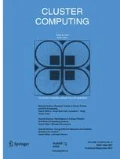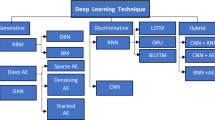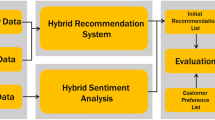Abstract
Due to the exponential growth of information, recommender systems have been a widely exploited technique to solve the problem of information overload effectively. Collaborative filtering (CF) is the most successful and extensively employed recommendation approach. However, current CF methods recommend suitable items for users mainly by user-item matrix that contains the individual preference of users for items in a collection. So these methods suffer from such problems as the sparsity of the available data and low accuracy in predictions. To address these issues, borrowing the idea of cognition degree from cognitive psychology and employing the regularized matrix factorization (RMF) as the basic model, we propose a novel drifting cognition degree-based RMF collaborative filtering method named CogTime_RMF that incorporates both user-item matrix and users’ drifting cognition degree with time. Moreover, we conduct experiments on the real datasets MovieLens 1 M and MovieLens 100 k, and the method is compared with three similarity based methods and three other latest matrix factorization based methods. Empirical results demonstrate that our proposal can yield better performance over other methods in accuracy of recommendation. In addition, results show that CogTime_RMF can alleviate the data sparsity, particularly in the circumstance that few ratings are observed.









Similar content being viewed by others
References
Lu, L., Medo, M., Yeung, C.H., Zhang, Y.-C., Zhang, Z.-K., Zhou, T.: Recommender systems. Phys. Rep. 519(1), 1–49 (2012)
Lops, P., De Gemmis, M., Semeraro, G.: Content-based recommender systems: state of the art and trends. In: Recommender Systems Handbook, pp. 73–105. Springer, New York (2011)
Kantor, P.B., Rokach, L., Ricci, F., Shapira, B.: Recommender Systems Handbook. Springer, Heidelberg (2011)
Ma, H., Zhou, T.C., Lyu, M.R., King, I.: Improving recommender systems by incorporating social contextual information. ACM Trans. Inf. Syst. (TOIS) 29(2), 9 (2011)
Wang, Y., Ruhe, G.: The cognitive process of decision making. Int. J. Cogn. Inf. Nat. Intell. 1(2), 73–85 (2007)
Galotti, K.M.: Cognitive Psychology In and Out of the Laboratory. SAGE Publications, Forlag (2013)
Schafer, J.B., Frankowski, D., Herlocker, J., Sen, S.: Collaborative filtering recommender systems. The Adaptive Web, pp. 291–324. Springer, Berlin (2007)
Kim, D., Yum, B.-J.: Collaborative filtering based on iterative principal component analysis. Expert Syst. Appl. 28(4), 823–830 (2005)
Brand, M.: Incremental singular value decomposition of uncertain data with missing values. In: Computer Vision ECCV 2002, pp. 707–720. Springer, Berlin (2002)
Paterek, A.: Improving regularized singular value decomposition for collaborative filtering. In: Proceedings of KDD Cup and Workshop, pp. 5–8. San Jose, Calif (2007)
Blei, D.M., Ng, A.Y., Jordan, M.I.: Latent Dirichlet allocation. J. Mach. Learn. Res. 3, 993–1022 (2003)
Koren, Y.: Factorization meets the neighborhood: a multifaceted collaborative filtering model. In: Proceedings of the 14th ACM SIGKDD International Conference on Knowledge Discovery and Data Mining, pp. 426–434. ACM, (2008)
Shen, Y., Jin, R.: Learning personal+ social latent factor model for social recommendation. In: Proceedings of the 18th ACM SIGKDD International Conference on Knowledge Discovery and Data Mining, pp. 1303–1311. ACM (2012)
Kabbur, S., Ning, X., Karypis, G.: Fism: factored item similarity models for top-n recommender systems. In: Proceedings of the 19th ACM SIGKDD International Conference on Knowledge Discovery and Data Mining, pp. 659–667. ACM (2013)
Zhang, C.-X., Zhang, Z.-K., Yu, L., Liu, C., Liu, H., Yan, X.-Y.: Information filtering via collaborative user clustering modeling. Phys. A Stat. Mech. Appl. 396, 195–203 (2014)
Ma, H.: An experimental study on implicit social recommendation. In: Proceedings of the 36th International ACM SIGIR Conference on Research and Development in Information Retrieval, pp. 73–82. ACM (2013)
Jianguo, L., Liangchao, Y., Yong, T., Huan, G.: Cognition degree-based collaborative filtering recommendation algorithm. J. Comput. Res. Dev. 46, 515–519 (2009)
Cai, Y., Leung, H.-F., Li, Q., Min, H., Tang, J., Li, J.: Typicality-based collaborative filtering recommendation. IEEE Trans. Knowl. Data Eng. 26(3), 766–779 (2014)
Berlin, S.: Cognitive-behavioral approaches. In: Rosenblatt, A., Waldfogel, D. (eds.) Handbook of Clinical Social Work, pp. 1095–1119. Iossey-Bass, San Francisco (1983)
Hupp, S.D., Reitman, D., Jewell, J.D.: Cognitive-behavioral theory. In: Handbook of Clinical Psychology: Children and Adolescents (2008)
Grieve, J., Gnanasekaran, L.: Neuropsychology for Occupational Therapists: Cognition in Occupational Performance. Wiley, New York (2013)
Zimprich, D., Martin, M., Kliegel, M.: Subjective cognitive complaints, memory performance, and depressive affect in old age: a change-oriented approach. Int. J. Aging Hum. Dev. 57(4), 339–366 (2003)
Bussey, K., Bandura, A.: Social cognitive theory of gender development and differentiation. Psychol. Rev. 106(4), 676 (1999)
Hu, S., Liu, Y., Chen, T., Liu, Z., Yu, Q., Deng, L., Yin, Y., Hosaka, S.: Emulating the Ebbinghaus forgetting curve of the human brain with a NiO-based memristor. Appl. Phys. Lett. 103(13), 133701 (2013)
Zhao, L., Sheng, F., Zhang, B.: Collaborative filtering based on user’s drifting interests. Int. J. Adv. Comput. Technol. 4(15), 336 (2012)
GroupLens. http://movielens.umn.edu. Group Lens Research group, Department of Computer Science and Engineering, University of Minnesota (2006). Accessed 26 March 2014
Acknowledgments
This work was partially supported by the following projects: National High-Technology Research and Development Program (863 Program) of China (Grant No. 2013AA01A212); National Natural Science Foundation of China (Grant Nos. 61272067, 61370178, 61202296, 61370229); National Science and Technology Support Program of China (Grant No. 2012BAH27F05); Natural Science Foundation of Guangdong Province of China (Grant No. S2012030006242); Science and Technology Support Program of Guangdong Provi-nce of China (Grant Nos. 2012A080104019, 2011B080100031); Large Data Security Industry Chain Oriented Collaborative Innovation Project (No. 201508010067).
Author information
Authors and Affiliations
Corresponding author
Rights and permissions
About this article
Cite this article
Chen, J., Tang, F., Xiao, J. et al. CogTime_RMF: regularized matrix factorization with drifting cognition degree for collaborative filtering. Cluster Comput 19, 821–835 (2016). https://doi.org/10.1007/s10586-016-0570-0
Received:
Revised:
Accepted:
Published:
Issue Date:
DOI: https://doi.org/10.1007/s10586-016-0570-0




